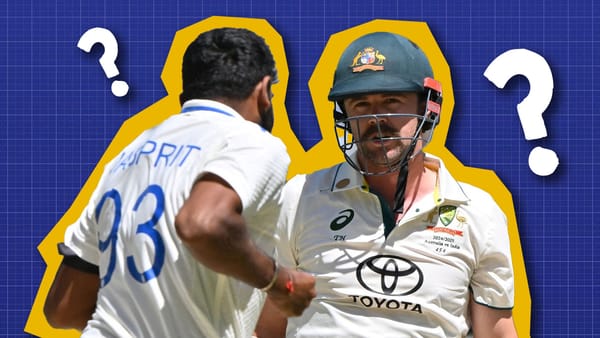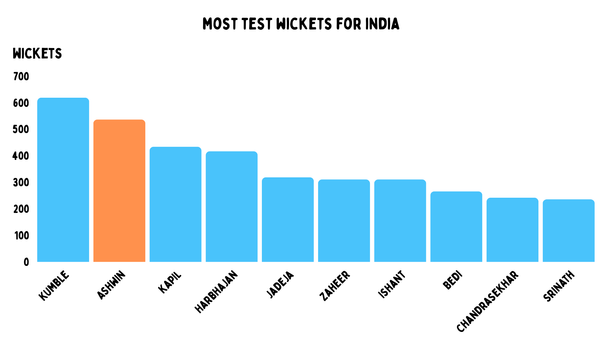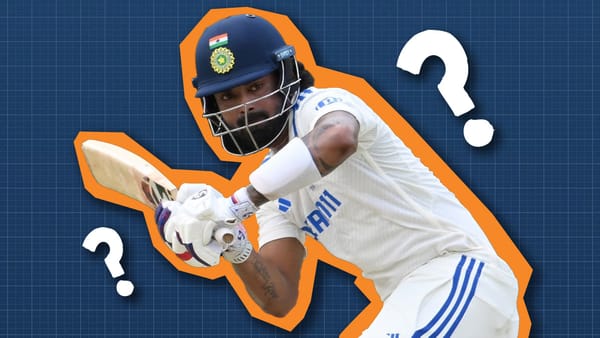Jos Buttler and the weirdness
Looking at the last Test and career of one of cricket's odder creatures.
Jos Buttler had a very weird Test match. It had one of the great catches of his career, one of the most simple drops he has made. He failed in the first innings through a lack of patience and trying to be aggressive. Then in the second innings showed brilliant resilience until he stood on his stumps just when it looked like England might hold on.
His career has followed similar odd patterns.
Buttler was - as far as I can tell - the last long-term specialist number seven in Tests. It's really not a position; almost everyone else is a keeper or all rounder. Occasionally, young players debut there. It's not regular to pick a senior batter in that position.
But England made him into a thing they didn't need as well. At that point, England had number sevens coming out their arse. Moeen Ali, Jonny Bairstow and Chris Woakes. Sam Curran, if you are so inclined. Number seven was the one spot they had nailed on, but Ed Smith was obsessed with what Buttler could do in the red ball team with his white-ball skills.
So he brought him back in - and the ramifications of that were pretty hardcore. First they tried to ensure that Bairstow didn't think Buttler was back to take his job. I don't know if anyone bought that - even if they truly meant it - Bairstow was pretty upset at it all happening.
But shit got so much wackier from there. In a short period, England used a lot of keepers. Buttler made a quality hundred as a specialist batter, and then Bairstow injured his finger.
🎙 New Red Inker 🎙
— Jarrod Kimber (@ajarrodkimber) 9:57 AM ∙ Dec 22, 2021
Chris Broad’s Ashes
On playing Malcolm Marshall, facing cricket’s first unplayable left-armer Bruce Reid, Merv Hughes, cricket in South Africa during apartheid and his fiery temperament.
anchor.fm/redinker/episo…
You could say a precedent had been set. If Bairstow didn't keep, Buttler would do the team thing and step up. Of course, to make all this more confusing, during this time, Former Wisden Editor Sycld Berry said that England should use both of these men to keep in the same Test ( [https://www.telegraph.co.uk/cricket/2016/06/14/jonny-bairstow-and-jos-buttler-should-share-england-wicketkeepin/](https://www.telegraph.co.uk/cricket/2016/06/14/jonny-bairstow-and-jos-buttler-should-share-england-wicketkeepin/) ) Shine on you crazy diamond.
Oh, and did I forget to mention that Buttler was the white ball keeper at this point? So England's Test gloveman for Sri Lanka was supposed to be Bairstow. But that changed because he injured himself in an earlier warm-up playing football. It meant that Ben Foakes was added to the squad, and England now had a three-headed monster. Now the obvious thing to do by this point was give the gloves to Buttler, explain to Bairstow that this means he'd get them back, as they had already shown they only wanted him as a batter.
Instead then selector Ed Smith went mega-brain. Like most of us nerds, Smith has theories on wicket keepers, and many revolve around Asia. It is tougher to keep there than anywhere else, because of the hours you are up to the stumps. Over 30% of both stumpings and catches standing up are missed. So my guess is that they thought with Foakes being allegedly - I only say that because we have no accurate stats to work this out - the best gloveman, they saw it as a chance to test their theory.
This was odd. Buttler was good enough to be the backup two Tests earlier, and now they were making a huge call about his keeping ability. Considering they eventually made him the keeper when they went to Asia, it is bizarre.
Bairstow - who kind of foretold this with every grimace - was already getting upset. Of course, Foakes made all this far more confusing by making an incredibly composed century on debut. Meaning they couldn't drop him. Which became legendary when Bairstow was fit for the next game.
Because now to fix all their previous problems, they kept Foakes in the side, and moved Bairstow to number three, where he made a hundred. So now you had Foakes claiming his spot, Bairstow claiming a new spot, and Buttler was now even more of a specialist batter than before. A three-headed wicket keeping monster that came from just baffling decisions.
So when Foakes was dropped four Tests later, Bairstow was moved back from number three to bat seven and keep again. Bairstow played 13 innings. His highest score was 52, but six times he made single figures. And so, at the end of the Ashes, Bairstow was dropped, and guess who became keeper, the specialist batter and third-choice, Buttler.
One Test after getting the gloves, Buttler injured himself and England had to use Ollie Pope to keep wickets. No, I'm not making it up; England had four keepers in ten Tests, and either Buttler or Bairstow, were available for all of them.
So England had made it very clear they didn't quite rate Buttler's keeping, and yet now he was number one.
You saw that this Test. People went absolutely crazy over Buttler's catch. But he of course then dropped two other chances. Then in the second innings, he took a hard one and dropped another. That is no one's idea of a good Test as a keeper.
The problem is Buttler doesn't move his feet, he stays still and dives.
Jos Buttler has had a tricky series so far behind the sticks, but he isn't the only 'keeper who has struggled 😣
— Cricket on BT Sport (@btsportcricket) 6:35 AM ∙ Dec 19, 2021
@MattPrior13 gives us a masterclass on how he modified his technique to improve his glovework 🤲
#Ashes
And while he's an incredible athlete, no one can catch consistently when diving. It's never going to lead to a good record. But like most western keepers, his record generally looks good, because most of the takes are fairly simple.
The tougher job is when you're up at the stumps.
Buttler has really struggled up there, and I think the best way to see it is through his stumping record. He is the only one with less than two stumpings of all the keepers in history with more than 50 Test dismissals. And he has 126 of them, so to have only one stumping is just bizarre. He has the lowest stumping percentage of any major keeper ever.
Most of the best rates are from the old days. Jack Blackham - known as the prince of keepers - has 40% of his dismissals as stumpings. No one thinks any current player would be like that.
The modern-day wicket keepers with high rates are generally Sri Lankans; Kaluwitharana, Jayawardene and Dickwella are all around 20%. Matthew Wade is the highest of the modern non-Asian keeper with 15%, but that seems like a real outlier. Quinton de Kock, AB de Villiers and Matt Prior are at five percent. BJ Watling, Peter Nevill and Brad Haddin are around three. Jos Buttler is at 0.79%.
He is dead last, behind South Africa's Dave Richardson and West Indies Jeffrey Dujon. If you are too young to put this together, Dujon was the wicket-keeper during the West Indies four paceman of the apocalypse era. He could barely see the stumps, let alone stand at them. And he took double the rate of stumpings of Buttler. Without Moeen Ali's bowling talent to help him.
Now, maybe this is just a bad luck thing, so I went and checked Buttler's first class record, and he has two more stumpings there. So in all, he takes 1.4% of his career keeping dismissals as stumpings. That is unfathomably low.
And if you think that he is an English keeper, so maybe he just missed spinning conditions. The first class ground that Buttler has kept the most at is Taunton, or as it's known on the circuit, Ciderabad. He also played a lot at Old Trafford, which has a lot of spin for an English ground. Now as a keeper you can only take what comes your way. And I don't have access to missed stumpings. But I know of one that still lives with me.
When Buttler missed Jermaine Blackwood in Barbados, 2015. England were defending 194. Blackwood was batting, at 87/4, there was a missed stumping by Buttler as Blackwood went early, gave Buttler a good look off Root, and he hadn't moved his hands as he presumably assumed the ball would be hit.
This is a common mistake of people who aren't first choice keepers. They aren't prepared for every ball to come through, so they have to react late. Because Buttler is such an outstanding athlete, he can often overcome the original mistake.
But he can't save them all. He has on two occasions allowed Jermaine Blackwood to beat England with fourth innings misses.Which is very bizarre.
But he's not there because of his keeping, that's obvious, so let's look at his batting. The idea is that Buttler's incredible ball striking would transform this English middle order through counter-attacking. His ODI strike rate is a fucken brutal 118.
You can see a lot more about his impact in white ball cricket here.
Since 2014 he is in the top 50 run scorers in Tests. This list filters out Colin de Grandhomme, who is the fastest scorer. So it has Sarfaraz Ahmed as number one, a strike rate of 72. De Kock is second at 71, just ahead of David Warner. At number 22, almost halfway down, is Buttler. Striking at 54.5. Behind Kane Williamson, Babar Azam, and his old mate Blackwood.
Now, maybe this is because he plays for England and has to come in during collapses and play out some draws. The only problem with that is he's the fourth-fastest player in his team. Ben Stokes, Joe Root and - this is awkward - Jonny Bairstow are all quicker scorers.
But let's be fair, Buttler has played some great dead batting innings at the end, so let's just look at the first innings. He's still only 15th quickest. And his strike rate is only 57 now. He's still a way off the three fastest scorers. And really, for strike rate to have a bit of impact, you probably need to be around that 70 mark. And he's a mile from that. He does not counter-attack often.
For context, in over 50 first class matches for Somerset and Lancashire he averages around 31 and a half and strikes at 60. That he has pretty much done the same in Test cricket is no real surprise. Of his ten highest professional scores, seven are against the white ball. His highest red ball is 152, two runs more than his highest in ODI.
And he averages early 30s in Test cricket. This sounds like a failure, but this is a decent number in the modern history of keepers. But more importantly, so bad is English batting right now, this is his team's third-best mark. You can see it as a failure considering what they expected, nut also a plus as at least he's making more runs than most.
Now that is helped by batting lower down the order. I am sure Joe Denly would have far enjoyed batting at seven. And that is also part of the problem, Buttler doesn't have the game to go higher up the order. So they are stuck with him at number six or seven.
Number sevens in his era average 30, so his 32.8 is a little above normal. But not enough to cover his keeping or the carnage caused by his initial selection as a specialist batter. Making it all more fun, he averages five more when not keeping. And also strikes quicker.
There is no doubt that everything I have said above is weird. Buttler was forced into the team, probably helping push out their third or fourth-best batter. He's allergic to stumpings. He takes catches that go viral and misses chances under 15s would take. He's a hall of fame white ball talent who has never been anything like that in Tests.
And in one Test, he went out predictably, took one of the great catches, missed one of the easiest, blocked out most of a day before stepping on his own stumps as the draw got closer. The thing is, considering everything that has come before, this all seems fairly normal now.
Jos Buttler has a very weird Test career.




